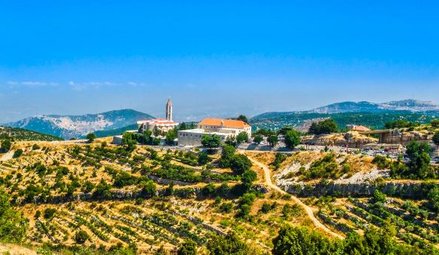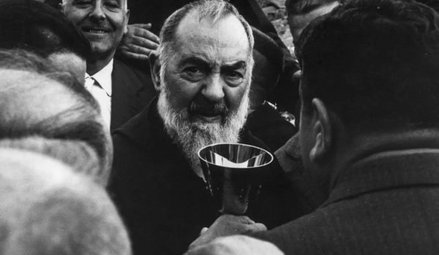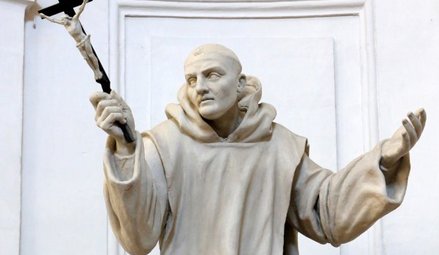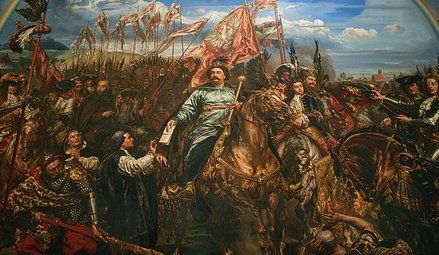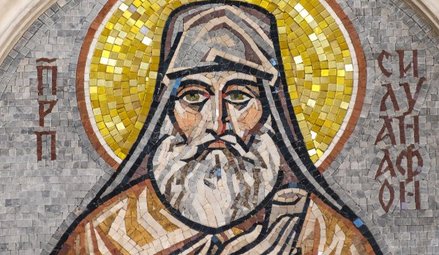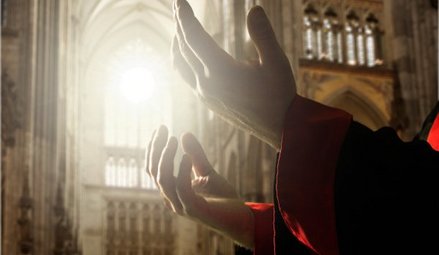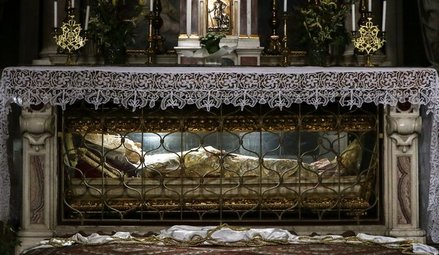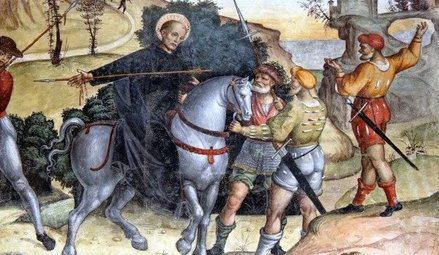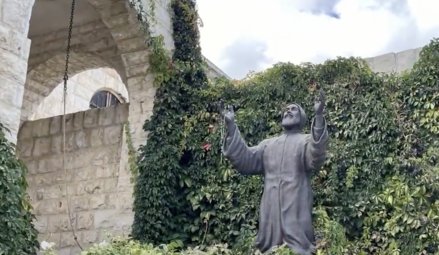- By theme
- Jesus
- The many proofs of Christ’s resurrection
- Saint Thomas Aquinas: God gave all the divine proofs we needed to believe
- The surpassing power of Christ's word
- Lewis’s trilemma: a proof of Jesus’s divinity
- God saves: the power of the holy name of Jesus
- Jesus spoke and acted as God's equal
- Jesus' divinity is actually implied in the Koran
- Jesus came at the perfect time of history
- Rabbinical sources testify to Jesus' miracles
- Mary
- The Church
- The Bible
- An enduring prophecy and a series of miraculous events preventing the reconstruction of the Temple
- The authors of the Gospels were either eyewitnesses or close contacts of those eyewitnesses
- Onomastics support the historical reliability of the Gospels
- The New Testament was not altered
- The New Testament is the best-attested manuscript of Antiquity
- The Gospels were written too early after the facts to be legends
- Archaeological finds confirm the reliability of the New Testament
- The criterion of embarrassment proves that the Gospels tell the truth
- The dissimilarity criterion strengthens the case for the historical reliability of the Gospels
- 84 details in Acts verified by historical and archaeological sources
- The unique prophecies that announced the Messiah
- The time of the coming of the Messiah was accurately prophesied
- The prophet Isaiah's ultra accurate description of the Messiah's sufferings
- Daniel's "Son of Man" is a portrait of Christ
- The Apostles
- Saint Peter, prince of the apostles
- Saint John the Apostle: an Evangelist and Theologian who deserves to be better known (d. 100)
- Saint Matthew, apostle, evangelist and martyr (d. 61)
- James the Just, “brother” of the Lord, apostle and martyr (d. 62 AD)
- Saint Matthias replaces Judas as an apostle (d. 63)
- The martyrs
- The protomartyr Saint Stephen (d. 31)
- Polycarp, bishop of Smyrna, disciple of John and martyr (d. 155)
- Justin Martyr: philosopher and apologist (d.165)
- Saint Blandina and the Martyrs of Lyon: the fortitude of faith (177 AD)
- Saint Agatha stops a volcano from destroying the city of Catania (d. 251)
- Saint Lucy of Syracuse, virgin and martyr for Christ (d. 304)
- Saint Boniface propagates Christianity in Germany (d. 754)
- Thomas More: “The king’s good servant, but God’s first”
- The martyrdom of Paul Miki and his companions (d. 1597)
- The martyrs of Angers and Avrillé (1794)
- The Martyrs of Compiègne (1794)
- The Vietnamese martyrs Father Andrew Dung-Lac and his 116 companions (17th-19th centuries)
- He braved torture to atone for his apostasy (d. 1818)
- Blaise Marmoiton: the epic journey of a missionary to New Caledonia (d. 1847)
- The Uganda martyrs: a recurring pattern in the persecution of Christians (1885)
- José Luis Sanchez del Rio, martyred at age 14 for Christ the King (d. 1928)
- Saint Maximilian Kolbe, Knight of the Immaculate (d. 1941)
- The monks
- The Desert Fathers (3rd century)
- Saint Anthony of the Desert, a father of monasticism (d. 356)
- Saint Benedict, father of Western monasticism (d. 550)
- Saint Bruno the Carthusian (d.1101): the miracle of a hidden life
- Blessed Angelo Agostini Mazzinghi: the Carmelite with flowers pouring from his mouth (d. 1438)
- Monk Abel of Valaam's accurate prophecies about Russia (d. 1841)
- The more than 33,000 miracles of Saint Charbel Maklouf (d. 1898)
- Saint Pio of Pietrelcina (d. 1968): How God worked wonders through "a poor brother who prays"
- The surprising death of Father Emmanuel de Floris (d. 1992)
- The prophecies of Saint Paisios of Mount Athos (d. 1994)
- The saints
- Saints Anne and Joachim, parents of the Virgin Mary (19 BC)
- Saint Nazarius, apostle and martyr (d. 68 or 70)
- Ignatius of Antioch: successor of the apostles and witness to the Gospel (d. 117)
- Saint Gregory the Miracle-Worker (d. 270)
- Saint Martin of Tours: patron saint of France, father of monasticism in Gaul, and the first great leader of Western monasticism (d. 397)
- Saint Augustine of Canterbury evangelises England (d. 604)
- Saint Lupus, the bishop who saved his city from the Huns (d. 623)
- Saint Rainerius of Pisa: from musician to merchant to saint (d. 1160)
- Saint Dominic of Guzman (d.1221): an athlete of the faith
- Saint Francis, the poor man of Assisi (d. 1226)
- Saint Anthony of Padua: "everyone’s saint"
- Saint Rose of Viterbo or How prayer can transform the world (d. 1252)
- Saint Simon Stock receives the scapular of Mount Carmel from the hands of the Virgin Mary
- The unusual boat of Saint Basil of Ryazan
- Saint Agnes of Montepulciano's complete God-confidence (d. 1317)
- The extraordinary conversion of Michelina of Pesaro
- Saint Peter Thomas (d. 1366): a steadfast trust in the Virgin Mary
- Saint Rita of Cascia: hoping against all hope
- Saint Catherine of Genoa and the Fire of God's love (d. 1510)
- Saint Anthony Mary Zaccaria, physician of bodies and souls (d. 1539)
- Saint Ignatius of Loyola (d. 1556): "For the greater glory of God"
- Brother Alphonsus Rodríguez, SJ: the "holy porter" (d. 1617)
- Martin de Porres returns to speed up his beatification (d. 1639)
- Virginia Centurione Bracelli: When God is the only goal, all difficulties are overcome (d.1651)
- Saint Marie of the Incarnation, "the Teresa of New France" (d.1672)
- St. Francis di Girolamo's gift of reading hearts and souls (d. 1716)
- Rosa Venerini: moving in the ocean of the Will of God (d. 1728)
- Saint Jeanne-Antide Thouret: heroic perseverance and courage (d. 1826)
- Seraphim of Sarov (1759-1833): the purpose of the Christian life is to acquire the Holy Spirit
- Camille de Soyécourt, filled with divine fortitude (d. 1849)
- Bernadette Soubirous, the shepherdess who saw the Virgin Mary (1858)
- Saint John Vianney (d. 1859): the global fame of a humble village priest
- Gabriel of Our Lady of Sorrows, the "Gardener of the Blessed Virgin" (d. 1862)
- Father Gerin, the holy priest of Grenoble (1863)
- Blessed Francisco Palau y Quer: a lover of the Church (d. 1872)
- Saints Louis and Zelie Martin, the parents of Saint Therese of Lisieux (d. 1894 and 1877)
- The supernatural maturity of Francisco Marto, “contemplative consoler of God” (d. 1919)
- Saint Faustina, apostle of the Divine Mercy (d. 1938)
- Brother Marcel Van (d.19659): a "star has risen in the East"
- Doctors
- The mystics
- Lutgardis of Tongeren and the devotion to the Sacred Heart
- Saint Angela of Foligno (d. 1309) and "Lady Poverty"
- Saint John of the Cross: mystic, reformer, poet, and universal psychologist (+1591)
- Blessed Anne of Jesus: a Carmelite nun with mystical gifts (d.1621)
- Catherine Daniélou: a mystical bride of Christ in Brittany
- Saint Margaret Mary sees the "Heart that so loved mankind"
- Jesus makes Maria Droste zu Vischering the messenger of his Divine Heart (d. 1899)
- Mother Yvonne-Aimée of Jesus' predictions concerning the Second World War (1922)
- Sister Josefa Menendez, apostle of divine mercy (d. 1923)
- Edith Royer (d. 1924) and the Sacred Heart Basilica of Montmartre
- Rozalia Celak, a mystic with a very special mission (d. 1944)
- Visionaries
- Saint Perpetua delivers her brother from Purgatory (203)
- María de Jesús de Ágreda, abbess and friend of the King of Spain
- Discovery of the Virgin Mary's house in Ephesus (1891)
- Sister Benigna Consolata: the "Little Secretary of Merciful Love" (d. 1916)
- Maria Valtorta's visions match data from the Israel Meteorological Service (1943)
- Berthe Petit's prophecies about the two world wars (d. 1943)
- Maria Valtorta saw only one pyramid at Giza in her visions... and she was right! (1944)
- The location of Saint Peter's village seen in a vision before its archaeological discovery (1945)
- The 700 extraordinary visions of the Gospel received by Maria Valtorta (d. 1961)
- The amazing geological accuracy of Maria Valtorta's writings (d. 1961)
- Maria Valtorta's astronomic observations consistent with her dating system
- Discovery of an ancient princely house in Jerusalem, previously revealed to a mystic (d. 1961)
- Mariette Kerbage, the seer of Aleppo (1982)
- The 20,000 icons of Mariette Kerbage (2002)
- The popes
- The great witnesses of the faith
- Saint Augustine's conversion: "Why not this very hour make an end to my uncleanness?" (386)
- Thomas Cajetan (d. 1534): a life in service of the truth
- Madame Acarie, "the servant of the servants of God" (d. 1618)
- Blaise Pascal (d.1662): Biblical prophecies are evidence
- Madame Élisabeth and the sweet smell of virtue (d. 1794)
- Jacinta, 10, offers her suffering to save souls from hell (d. 1920)
- Father Jean-Édouard Lamy: "another Curé of Ars" (d. 1931)
- Christian civilisation
- The depth of Christian spirituality
- John of the Cross' Path to perfect union with God based on his own experience
- The dogma of the Trinity: an increasingly better understood truth
- The incoherent arguments against Christianity
- The "New Pentecost": modern day, spectacular outpouring of the Holy Spirit
- The Christian faith explains the diversity of religions
- Cardinal Pierre de Bérulle (d.1629) on the mystery of the Incarnation
- Christ's interventions in history
- Marian apparitions and interventions
- The Life-giving Font of Constantinople
- Apparition of Our Lady of La Treille in northern France: prophecy and healings (600)
- Our Lady of Virtues saves the city of Rennes in Bretagne (1357)
- Mary stops the plague epidemic at Mount Berico (1426)
- Our Lady of Miracles heals a paralytic in Saronno (1460)
- Cotignac: the first apparitions of the Modern Era (1519)
- Savona: supernatural origin of the devotion to Our Lady of Mercy (1536)
- The Virgin Mary delivers besieged Christians in Cusco, Peru
- The victory of Lepanto and the feast of Our Lady of the Rosary (1571)
- The apparitions to Brother Fiacre (1637)
- The “aldermen's vow”, or the Marian devotion of the people of Lyon (1643)
- Our Lady of Nazareth in Plancoët, Brittany (1644)
- Our Lady of Laghet (1652)
- Saint Joseph’s apparitions in Cotignac, France (1660)
- Heaven confides in a shepherdess of Le Laus (1664-1718)
- Zeitoun, a two-year miracle (1968-1970)
- The Holy Name of Mary and the major victory of Vienna (1683)
- Heaven and earth meet in Colombia: the Las Lajas shrine (1754)
- The five Marian apparitions that traced an "M" over France, and its new pilgrimage route
- A series of Marian apparitions and prophetic messages in Ukraine since the 19th century (1806)
- "Consecrate your parish to the Immaculate Heart of Mary" (1836)
- At La Salette, Mary wept in front of the shepherds (1846)
- Our Lady of Champion, Wisconsin: the first and only approved apparition of Mary in the US (1859)
- Gietrzwald apparitions: heavenly help to a persecuted minority
- The silent apparition of Knock Mhuire in Ireland (1879)
- Mary "Abandoned Mother" appears in a working-class district of Lyon, France (1882)
- The thirty-three apparitions of the Virgin Mary in Beauraing (1932)
- "Our Lady of the Poor" appears eight times in Banneux (1933)
- Fontanelle-Montichiari apparitions of Our Lady "Rosa Mystica" (1947)
- Mary responds to the Vows of the Polish Nation (1956)
- Zeitoun apparitions
- The Virgin Mary comes to France's rescue by appearing at L'Ile Bouchard (1947)
- Maria Esperanza Bianchini and Mary, Mary, Reconciler of Peoples and Nations (1976)
- Luz Amparo and the El Escorial apparitions
- The extraordinary apparitions of Medjugorje and their worldwide impact
- The Virgin Mary prophesied the 1994 Rwandan genocide (1981)
- Our Lady of Soufanieh's apparition and messages to Myrna Nazzour (1982)
- The Virgin Mary heals a teenager, then appears to him dozens of times (1986)
- Seuca, Romania: apparitions and pleas of the Virgin Mary, "Queen of Light" (1995)
- Angels and their manifestations
- Mont Saint-Michel: Heaven watching over France
- The revelation of the hymn Axion Estin by the Archangel Gabriel (982)
- Angels give a supernatural belt to the chaste Thomas Aquinas (1243)
- The constant presence of demons and angels in the life of St Frances of Rome (d. 1440)
- Mother Yvonne-Aimée escapes from prison with the help of an angel (1943)
- Saved by Angels: The Miracle on Highway 6 (2008)
- Exorcisms in the name of Christ
- A wave of charity unique in the world
- Saint Peter Nolasco: a life dedicated to ransoming enslaved Christians (d. 1245)
- Rita of Cascia forgives her husband's murderer (1404)
- Saint Angela Merici: Christ came to serve, not to be served (d. 1540)
- Saint John of God: a life dedicated to the care of the poor, sick and those with mental disorders (d. 1550)
- Saint Camillus de Lellis, reformer of hospital care (c. 1560)
- Blessed Alix Le Clerc, encouraged by the Virgin Mary to found schools (d. 1622)
- Saint Vincent de Paul (d. 1660), apostle of charity
- Marguerite Bourgeoys, Montreal's first teacher (d. 1700)
- Frédéric Ozanam, inventor of the Church's social doctrine (d. 1853)
- Damian of Molokai: a leper for Christ (d. 1889)
- Pier Giorgio Frassati (d.1925): heroic charity
- Saint Dulce of the Poor, the Good Angel of Bahia (d. 1992)
- Mother Teresa of Calcutta (d. 1997): an unshakeable faith
- Heidi Baker: Bringing God's love to the poor and forgotten of the world
- Amazing miracles
- The miracle of liquefaction of the blood of St. Januarius (d. 431)
- The miracles of Saint Anthony of Padua (d. 1231)
- Saint Pius V and the miracle of the Crucifix (1565)
- Saint Philip Neri calls a teenager back to life (1583)
- The resurrection of Jérôme Genin (1623)
- Saint Francis de Sales brings back to life a victim of drowning (1623)
- Saint John Bosco and the promise kept beyond the grave (1839)
- The day the sun danced at Fatima (1917)
- Pius XII and the miracle of the sun at the Vatican (1950)
- When Blessed Charles de Foucauld saved a young carpenter named Charle (2016)
- Reinhard Bonnke: 89 million conversions (d. 2019)
- Miraculous cures
- The royal touch: the divine thaumaturgic gift granted to French and English monarchs (11th-19th centuries)
- With 7,500 cases of unexplained cures, Lourdes is unique in the world (1858-today)
- Our Lady at Pellevoisin: "I am all merciful" (1876)
- Mariam, the "little thing of Jesus": a saint from East to West (d.1878)
- The miraculous healing of Marie Bailly and the conversion of Dr. Alexis Carrel (1902)
- Gemma Galgani: healed to atone for sinners' faults (d. 1903)
- The miraculous cure of Blessed Maria Giuseppina Catanea
- The extraordinary healing of Alice Benlian in the Church of the Holy Cross in Damascus (1983)
- The approved miracle for the canonization of Juan Diego Cuauhtlatoatzin (1990)
- Healed by St Charbel Makhlouf, her scars bleed each month for the benefit of unbelievers (1993)
- The miracle that led to Brother André's canonisation (1999)
- Bruce Van Natta's intestinal regrowth: an irrefutable miracle (2007)
- He had “zero” chance of living: a baby's miraculous recovery (2015)
- Manouchak, operated on by Saint Charbel (2016)
- How Maya was cured from cancer at Saint Charbel's tomb (2018)
- Preserved bodies of the saints
- Dying in the odour of sanctity
- The body of Saint Cecilia found incorrupt (d. 230)
- Saint Claudius of Besançon: a quiet leader, a calm presence, and a strong belief in the value of prayer (d. 699)
- Stanislaus Kostka's burning love for God (d. 1568)
- Saint Germaine of Pibrac: God's little Cinderella (d. 1601)
- Blessed Antonio Franco, bishop and defender of the poor (d. 1626)
- Giuseppina Faro, servant of God and of the poor (d. 1871)
- The incorrupt body of Marie-Louise Nerbollier, the visionary from Diémoz (d. 1910)
- The great exhumation of Saint Charbel (1950)
- Bilocations
- Inedias
- Levitations
- Lacrimations and miraculous images
- Saint Juan Diego's tilma (1531)
- The Rue du Bac apparitions of the Virgin Mary to St. Catherine Labouré (Paris, 1830)
- Mary weeps in Syracuse (1953)
- Teresa Musco (d.1976): salvation through the Cross
- Soufanieh: A flow of oil from an image of the Virgin Mary, and oozing of oil from the face and hands of Myrna Nazzour (1982)
- The Saidnaya icon exudes a wonderful fragrance (1988)
- Our Lady weeps in a bishop's hands (1995)
- Stigmates
- The venerable Lukarda of Oberweimar shares her spiritual riches with her convent (d. 1309)
- Florida Cevoli: a heart engraved with the cross (d. 1767)
- Blessed Maria Grazia Tarallo, mystic and stigmatist (d. 1912)
- Saint Padre Pio: crucified by Love (1918)
- Elena Aiello: "a Eucharistic soul"
- A Holy Triduum with a Syrian mystic, witnessing the sufferings of Christ (1987)
- A Holy Thursday in Soufanieh (2004)
- Eucharistic miracles
- Lanciano: the first and possibly the greatest Eucharistic miracle (750)
- A host came to her: 11-year-old Imelda received Communion and died in ecstasy (1333)
- Faverney's hosts miraculously saved from fire
- A tsunami recedes before the Blessed Sacrament (1906)
- Buenos Aires miraculous host sent to forensic lab, found to be heart muscle (1996)
- Relics
- The Veil of Veronica, known as the Manoppello Image
- For centuries, the Shroud of Turin was the only negative image in the world
- The Holy Tunic of Argenteuil's fascinating history
- Saint Louis (d. 1270) and the relics of the Passion
- The miraculous rescue of the Shroud of Turin (1997)
- A comparative study of the blood present in Christ's relics
- Jews discover the Messiah
- Francis Xavier Samson Libermann, Jewish convert to Catholicism (1824)
- Our Lady of the Miraculous Medal and the conversion of Alphonse Ratisbonne (1842)
- Max Jacob: a liberal gay Jewish artist converts to Catholicism (1909)
- Edith Stein - Saint Benedicta of the Cross: "A daughter of Israel who, during the Nazi persecutions, remained united with faith and love to the Crucified Lord, Jesus Christ, as a Catholic, and to her people as a Jew"
- Patrick Elcabache: a Jew discovers the Messiah after his mother is miraculously cured in the name of Jesus
- Olivier's conversion story: from Pesach to the Christian Easter (2000)
- Cardinal Aron Jean-Marie Lustiger (d. 2007): Chosen by God
- Muslim conversions
- He met Jesus while looking for Muhammad (1990)
- Selma's journey to baptism (1996)
- Soumia, converted to Jesus as she hears Christmas carols (2003)
- How Aïsha, a Muslim convert, found Jesus (2004)
- Amir chooses Christ, at the risk of becoming homeless (2004)
- Souad Brahimi: brought to Jesus by Mary (2012)
- Pursued by God: Khadija's story (2023)
- Buddhist conversions
- Atheist conversions
- The conversion of an executioner during the Terror (1830)
- God woos a poet's heart: the story of Paul Claudel's conversion (1886)
- From agnostic to Catholic Trappist monk (1909)
- Dazzled by God: Madeleine Delbrêl's story (1924)
- C.S. Lewis, the reluctant convert (1931)
- The day André Frossard met Christ in Paris (1935)
- MC Solaar's rapper converts after experiencing Jesus' pains on the cross
- Father Sébastien Brière, converted at Medjugorje (2003)
- Franca Sozzani, the "Pope of fashion" who wanted to meet the Pope (2016)
- Nelly Gillant: from Reiki Master to Disciple of Christ (2018)
- Testimonies of encounters with Christ
- Near-death experiences (NDEs) confirm Catholic doctrine on the Four Last Things
- The NDE of Saint Christina the Astonishing, a source of conversion to Christ (1170)
- Jesus audibly calls Alphonsus Liguori to follow him (1723)
- Blessed Dina Bélanger (d. 1929): loving God and letting Jesus and Mary do their job
- Gabrielle Bossis: He and I
- André Levet's conversion in prison
- Journey between heaven and hell: a "near-death experience" (1971)
- Jesus' message to Myrna Nazzour (1984)
- Alicja Lenczewska: conversations with Jesus (1985)
- Vassula Ryden and the "True Life in God" (1985)
- Nahed Mahmoud Metwalli: from persecutor to persecuted (1987)
- The Bible verse that converted a young Algerian named Elie (2000)
- Invited to the celestial court: the story of Chantal (2017)
- Providential stories
- The superhuman intuition of Saint Pachomius the Great
- Ambrose of Milan finds the bodies of the martyrs Gervasius and Protasius (386)
- Germanus of Auxerre's prophecy about Saint Genevieve's future mission, and protection of the young woman (446)
- Seven golden stars reveal the future location of the Grande Chartreuse Monastery (1132)
- The supernatural reconciliation of the Duke of Aquitaine (1134)
- Saint Zita and the miracle of the cloak (13th c.)
- Joan of Arc: "the most beautiful story in the world"
- John of Capistrano saves the Church and Europe (1456)
- A celestial music comforts Elisabetta Picenardi on her deathbed (d. 1468)
- Gury of Kazan: freed from his prison by a "great light" (1520)
- The strange adventure of Yves Nicolazic (1623)
- Julien Maunoir miraculously learns Breton (1626)
- Pierre de Keriolet: with Mary, one cannot be lost (1636)
- How Korea evangelized itself (18th century)
- A hundred years before it happened, Saint Andrew Bobola predicted that Poland would be back on the map (1819)
- The prophetic poem about John Paul II (1840)
- Don Bosco's angel dog: Grigio (1854)
- The purifying flames of Sophie-Thérèse de Soubiran La Louvière (1861)
- Thérèse of Lisieux saved countless soldiers during the Great War
- Lost for over a century, a Russian icon reappears (1930)
- In 1947, a rosary crusade liberated Austria from the Soviets (1946-1955)
- The discovery of the tomb of Saint Peter in Rome (1949)
- He should have died of hypothermia in Soviet jails (1972)
- God protects a secret agent (1975)
- Flowing lava stops at church doors (1977)
- A protective hand saved John Paul II and led to happy consequences (1981)
- Mary Undoer of Knots: Pope Francis' gift to the world (1986)
- Edmond Fricoteaux's providential discovery of the statue of Our Lady of France (1988)
- The Virgin Mary frees a Vietnamese bishop from prison (1988)
- The miracles of Saint Juliana of Nicomedia (1994)
- Global launch of "Pilgrim Virgins" was made possible by God's Providence (1996)
- The providential finding of the Mary of Nazareth International Center's future site (2000)
- Syrian Monastery shielded from danger multiple times (2011-2020)
- Jesus
- Who are we?
- Make a donation
TOUTES LES RAISONS DE CROIRE
Les moines
n°222
Mount Athos (Macedonia, Greece)
1924 - 1994
The prophecies of Saint Paisios of Mount Athos
Mount Athos, also known as "the Holy Mountain", is located in northern Greece and is a major centre of Orthodox Christianity. The first monastic community was established there in 1054, and today there are twenty monasteries and several hermitages. Saint Paisios was one of the two thousand monks who lived there in the 20th century. He wrote extensively, interpreting the events and trends of his time in a particularly enlightened way, describing their consequences, and accurately prophesying many of the calamities of today's world.
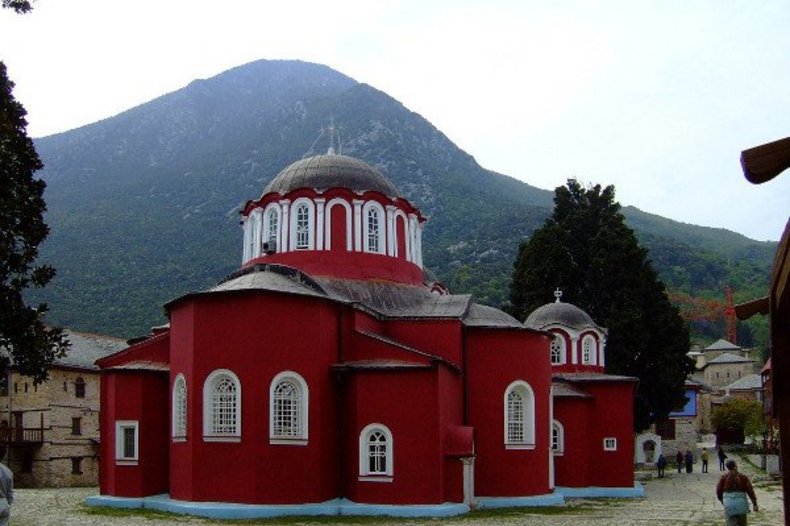
The main church of the Great Lavra monastery, with Mount Athos in the background /© CC Dimboukas.
Les raisons d'y croire :
- Paisios' writings were published by Holy Monastery "Evangelist John the Theologian", Souroti, Thessaloniki, Greece; and distributed in the US by St. Herman of Alaska Monastery
During his lifetime (1924-1994), Paisios spoke of "senseless wars" and announced the wars of the Israeli-Arab conflicts, the civil war in Lebanon (1975-1990) and the war in Iraq (2003), over weapons of mass destruction that never existed.
- In 1985, after the first Schengen Agreement establishing free movement between the signatory countries (creation of Europe's Schengen Area, in which internal border checks have largely been abolished), Paisios predicted its limited success.
In 1989, when the mood was euphoric with the fall of the Berlin Wall, Paisios went against the tide, predicting the danger of the "Russian boot" which later manifested itself in Georgia, Crimea, Syria and Ukraine.
- During his lifetime, Paisios also predicted the growing persecution of Christians throughout the world. Some 365 million Christians are persecuted every year, with mass murders in Asia, the Middle East and Africa (including the latest 200 victims in Nigeria). He also predicted that the Church and the media would remain silent, avoiding confrontation.
Paisios sensed that "the Church is made vulnerable, especially in the person of priests. There are many people today who are working to pervert everything, the family, young people and the Church." He encouraged us not to remain silent, but to face up to our responsibilities "without waiting for someone else to pull the snake out of its nest". These words make sense today.
- In addition to the prophecies fulfilled on the geopolitical and societal levels, several miracles of healing (blindness, cancer, possession, etc.)have been reported, involving the person of the father, both during his lifetime and after his death. We can cite two by way of example.
- Larisa Nicolaïevna Maslova, a doctor in Moscow, was admitted to hospital on 4 February 2002 after a serious accident that caused her to lose her vision in her left eye. She spent her first night in prayer, distressed and unable to sleep. In the morning, she saw a monk bend over her and cover her head with a towel. She recognised him as Saint Paisios, from one of the books she had read. The moment the monk disappeared, Larisa regained her sight in the eye that had been damaged.
- A young man was speeding on his motorbike when he hit a car and was thrown far away. Miraculously, an unknown monk held him firmly by the arm and the biker landed safely. Quite shaken, the young man told his parish priest in Thessaloniki. The priest showed him photos of former monks, among whom the young man immediately recognised Elder Paisios of the Holy Mountain. They later learned that the biker's mother had put two photos in her son's jacket pocket, without telling him: one an icon of Christ, the other of Elder Paisios.
- Paisios often gave off a scent as he passed by, and people who spoke with him or opened one of his books often noticed this. When he died, all the visitors testified that a strong and pleasant odour was exuding from his body and his clothes.
Synthèse :
How the written prophecies of Father Païssios came to us
I met Father Jules Baghdassarian in 2009 when my wife set up the Dar Basile Nursing Institute (at the request of Mons. Jean Clément Jeanbart, Archbishop of the Melkite Church in Aleppo). At the time, he was bursar and, at the same time, Apostolic Nuncio to Syria. We quickly became friends.
In July 2012, our safety was no longer guaranteed and we were forced to leave Aleppo in a hurry. On the eve of our departure, Father Jules gave me a document that was particularly close to his heart, and said: "Jean-Claude, I met Father Paisios, he's a holy man. You must translate his messages, because France must listen to his prophecies!"I was very surprised, but I knew of Father Jules' spiritual gifts and his tireless devotion to the incessant influx of refugees, women, children and the elderly, which meant that all the church buildings, schools and dispensaries had to be requisitioned. He had been organising soup kitchens in the parishes for many months. I trusted him, and as I went to greet him on the morning of our departure, he insisted again, reminding me that Father Paisios was considered one of the greatest ascetics on Mount Athos (famous for the twenty monasteries established since the 10th century). The original document was in Greek and he had translated it into Arabic. I had to make a French version.
Four months later, in November 2012, Father Jules did not fall victim to bullets like so many other priests, but on the evening of a trying day, he was struck down by a stroke. On learning of the priest's death, I asked the Lord that my friend might help me to be faithful to the spirit of this precious document, which he believed to be prophetic.
The Holy Mountain and Father Paisios
Located on the mountainous peninsula of Macedonia, in Greece, the Holy Mountain enjoys autonomous status: it is the monastic republic of Mount Athos, confirmed in international law by the Treaty of Lausanne in 1923, and listed as a UNESCO World Heritage Site. Emperor Constantine VI gave the land to the monks, who combined eremitism and cenobitism. It was at Mount Athos that the humble Elder Paisios (1924 - 1994) uttered geopolitical prophecies and helped his visitors who consulted him about world events maintain their spiritual balance in an increasingly hostile world which endangered their salvation. Paisios foretold senseless wars, the impasse in which the Europe of Schengen would find itself, the security obsession of the United States, the "Russian boot", and the sliding of our world into scandal and corruption...
Excerpts from Saint Paisios' prophetic announcements and enlightened interpretations:
There is a war today, a holy war. If the metropolitans keep silent, who will speak out? What bothers me is the prevailing calm in the face of what's coming. So far, we don't have a clear understanding of what's going on and, until I die, I won't know the outcome of this complex situation. What is certain is that the fate of the world rests on a handful of men, and God never ceases to call them to account. The prayers of suffering hearts can force God's hand. The events we are about to experience, the plots, the bombs, the ashes, the earthquakes will darken our horizon, and perhaps we will need a violent storm to sweep away all these calamities.
The situation may seem frightening, as an attempt is being made to erect a Tower of Babel between us. But despite this, I say to you: "Do not be afraid ". For God continues to dwell in the hearts of some Christians - this people of prayer who resist. I am serene and confident, because our benevolent God will put everything back in its place. Mankind has weathered storms without being destroyed. Should we be frightened by the coming one? Yes, but we will not perish! In the heart of each of us lies a hidden strength that reveals itself in times of need. And God is the only judge of us all, according to our merits.
Today, some are trying to destroy the foundations of our faith, by discreetly, surreptitiously, stone by stone, removing everything that once held it together. We are all responsible for this destruction, not just those who are bent on destroying it. We see and experience this collapse, and what efforts are we making to strengthen it? The Church has been made vulnerable, particularly in the person of priests. There are many people today who are working to pervert everything, the family, young people and the Church. It's difficult to contest a state or a nation whose laws flout those of God.
I've heard priests say: "Let' s not get involved, it's none of our business ". If they had achieved total detachment through prayer, I would have kissed their feet. But I can't do that, because in fact they prefer to live in indifference and comfort. Indifference is unacceptable for the laity, and even more so for the clergy: "Cursed are they who do the Lord's work carelessly" (Jer 48-10). Today, a holy war is taking place, and it's up to me to be on the front line against the Marxists, the Freemasons, the Satanists and the sects! What I see of what lies ahead hurts me to the point of tasting the bitterness of human pain in my mouth. It is by the spirit that the trial will be overcome, and the storm will throw all that is useless on the shore. Some will then be rewarded, while others will have to pay their debts.
We are in the reign of half-heartedness! There are few men of courage, because we are corrupt. How does God continue to put up with us? Today's generation is the generation of indifference. Since there are no more warriors, the majority are content to parade around. Impiety and blasphemy are allowed on television. The Church is silent and does not blame blasphemers. What is she waiting for? She has to, without waiting for someone else to pull the snake out of its nest, so that we can live in peace. Because of their indifference, they have become silent! What's worse is that even those with a remnant of faith are asking themselves: "Is there anything I can do to change the situation?" Let us boldly bear witness to our faith, because if we continue to remain silent, we will have to respond in the end. For it is up to each of us, in these difficult days, to stand up and do what we can, and to let God sort out what He can. Then we will have a clear conscience. If we don't take up the cause of resistance, our ancestors, who worked so hard for their country, will rise from their graves!
What are we doing for them, we Christians who do not bear witness to our faith, who do not resist evil and who allow the influence of those who want to destroy us to grow? When the Church persists in her silence, to avoid a confrontation with our rulers, if the metropolitans are silent and the monks are silent, then who is going to speak out? The lukewarmness of the clergy encourages laziness. To avoid being pushed around, priests prefer not to raise alarm. They don't want to talk about war, or the Apocalypse, or the death we have to prepare for. Some, with hypocritical kindness, protect heretics and their delusions to show their tolerance. People are soft, unleavened!
We make a mockery of holiness if we give priority to our own comfort. Being spiritually gentle is one thing, being neglectful is another. Some people claim that to be a Christian is to be joyful and calm. But are they Christians... or simply joyful, calm and indifferent? Their joy is superficial. Those who live a life of worldliness cannot be spiritual, because the spiritual being is built in pain. In other words, he suffers from everything that happens around him, he shares people's pain and God covers him with his compassion because of this shared suffering. The goal for us today is to live as Orthodox, not to speak or write as Orthodox. The preacher who does not live deeply will never touch anyone's heart, will never change people. And everyone knows that thinking Orthodox is easy, but living as Orthodox requires a lot of effort.
God tolerates what happens. But if your neighbour is wounded in his call to holiness, then your indignation is legitimate. It is unseemly to be angry when attacked. But it is a duty to do so in defence of serious spiritual issues, for the sake of our holy faith. Countering blasphemers means defending your neighbour, thinking of him with love.
Evil is in us, and when we do not have love, we cannot feel that everyone is our brother, because we only see his faults. "Woe to the man through whom sin comes" (Mt 18:7) means that we must not expose the moral weaknesses of our brothers to everyone, because, in a way, we are giving weapons to the enemies of the Church. And the faith of the weak is also altered. If you want to help the Church, try to correct yourself rather than others. By correcting yourself, you are correcting part of yourself, and if everyone started doing that, the Church would be perfect. Today, people take care of everything and everyone, because it's very easy to moralise others, whereas improving yourself requires an effort.
Truth spoken without judgement can be criminal. And the person who sets himself up as the holder of the truth commits an evil against himself and against others, because his sincerity is devoid of empathy. A Christian is not a fanatic, because he has love in his heart. Devotion is laudable, as is passion for what is good, but discernment and personal development guard against fanaticism, the companion of false devotion. It is essential to be alert and restrained. We must do everything for the love of God. When we seek the approval of others, we must be careful not to derive any personal benefit from it.
Our age lives in sensationalism and noise. But the spiritual life is not noisy. We need God's illumination to bring us out of darkness and confusion. There was a time when the Holy Spirit would light the way for us, but today he sees no reason to turn to us. Difficult years lie ahead, and the Tower of Babel of the Old Testament will seem insignificant compared to what lies ahead. The seal of Antichrist is coming. It is quite possible that you will experience much of what is described in the book of Revelation. The situation is terrible and the apostasy is upon us. Reread 2 Thess 2: 3-4: " Let no one deceive you in any way, for first comes the apostasy and the revelation of the ungodly man, the lost one, the adversary, the one who exalts himself above all that bears the name of God... making himself out to be God."
That's where we are now: the world has turned into a madhouse. There is a lot of confusion, governments are acting unconsciously, and we are facing unpredictable events in rapid succession. Freemasonry, the financial markets, the world trade organisation, world governance and the creation of a prefabricated universal religion: all this emanates from a diabolical plan and is part of it. Christians around the world are being and will be persecuted, as is foretold for the end of time. Sacred Scripture tells us that even the elect will be deceived and abused. Providence has told me that the Antichrist wants to enslave the world using what was described in the Book of Revelation two thousand years ago: "Everyone, whether small or great, rich or poor, free or slave, will be branded on the right hand or on the forehead, and no one will be able to buy or sell unless he is branded with the name of the beast or with the number of his name [...]. The number of the beast is a man's number, his number is 666" (Rev 13:16-18). This has to do with what is written in the Book of Kings and the Second Book of Chronicles: Solomon surpassed in wealth all the kings of the earth, receiving from the peoples he had conquered by war an annual tax of 666 talents of gold. In other words, 666 became the number of mammon, the Aramaic word for wealth, which personifies money and enslaves the world.
Orthodox Christians are opposed to this: we want neither dictatorship nor Antichrist. There will be difficult times when those who do not accept the "mark" will be excluded: "Accept it," they will tell you, "and you'll have no problem!" Can some people accept the "mark" without knowing it? No. If a person is unaware of it, it's because they're not interested in knowing, so they run the risk of losing divine grace. When a priest immerses a child in baptismal water, the child receives the Holy Spirit without knowing it, but divine grace enters the child and remains there. Some people wonder about God's power within us, and ask themselves what they have to do?
Some so-called modern priests treat their flocks like children so as not to be bothered by their questions: "What is happening today is not serious, have no fear, the important thing is to have faith in your hearts", they say. They go so far as to rebuke you: "Questions about Revelation and what we are experiencing today are there to confuse us". Instead, they should encourage you to live more spiritually, to draw closer to Christ who takes away all fear, and to prepare yourself for the trials to come. Knowing the truth is thought-provoking, and wakes people up from their torpor. Starting to pray, to be awake, means not falling into the traps that are set for you. But what do we see today? Those who interpret the Holy Scriptures arrange the prophecies in their own way. It would be preferable if they were not afraid to express their concerns, in order to help Christians worry about their salvation.
The world has lost control of events. We have forgotten the meaning of sacrifice, of dignity, and the joy that comes from sacrifice. We've come to think only of ourselves. That's where the pain of living comes from. It's when we share the suffering of others, when we forget ourselves for others, that we receive divine grace and miracles happen. It's like being in a boiling cauldron, you need daring and courage. We need to be vigilant and not let ourselves be taken by surprise if we are to withstand the trials that lie ahead. In these difficult times, we need to be not just ready, but at least three times ready. Don't settle back into your peaceful life: "Be ready, for in an hour you do not expect the Son of Man will come" (Mt 24:44).
I see something that is being prepared in fear and is constantly being postponed... Who is delaying what is to come... Who is giving us these postponements, if not God, to prepare us? As long as we know what awaits us, we must nurture true brotherly love, the source of true strength. The trial of death only strengthens God's mercy, especially for those who sacrifice themselves heroically to defend others, because to imitate Christ is to accept to give your life for those you love. This is the price of eternal life. All these schemes will lead to Christian unity, not the unity that some hope for, but according to the true prophecy: "One flock and one Shepherd." We must not give in to fear in the face of such events, for God, who knows us, wants us to be calm and serene so that we can use our reason and continue to pray, whatever happens. Through the fear of God, even the weakest man can conquer himself.
Jean-Claude and Geneviève Antakli, writers and biologists.
Au-delà des raisons d'y croire :
The persistence of prophecies throughout history is a response to a specific revelation that opens the way to new existential perspectives. More than a diviner, the prophet, as we have seen in biblical prophecy, is above all "the one who is called by God". He is the one who clearly sees the present, the consequences that flow from it, and the best course of action according to God. He is first and foremost a spiritual guide.
Aller plus loin :
Saint Paisios of Mount Athos by Hieromonk Isaac, The Holy Monastery of Saint Arsenios the Cappadocian; 2nd edition (January 1, 2016)










